The first Cole started in textiles in the 1860’s if you want to read back that far!
Scroll down to read our evolution through time...
In 2022, The Cole Fabrics Group Limited was formed in order to restructure our global companies.
Cole Fabrics Europe SAS in France was set up to allow Coles to continue to sell into Europe after the BREXIT agreement.

Click on image to view
2020 marked the acquisition of Nick Clarke's family company, Signature Ribbon Ltd, and he joined Cole Fabrics in Nottingham.

Click on image to view
Pippa Saxby (nee Cole) becomes the MD of Global Ribbons Italia Srl taking over from Dick Cole.
Meanwhile, Cole Fabrics (Shanghai) Ltd was established and began operating from it's base in Shanghai, allowing direct sales in China.
Acquisition of the textile arm of John MacLennan Textiles and Insulating Materials Ltd. This added head & tail bands, elastic loops and tassels to our ranges.

Click on image to view
Pippa Saxby (nee Cole), Dick Cole's daughter, joins the company.
Cole Fabrics Plc acquired a portion of the assets of Selectus Ltd who were based in Biddulph, UK and Guangdong, China . This allowed the company to further strengthen its position in the UK decorative ribbon market and enhance the UK weaving and dyeing capabilities.
Nick Cole moved to Hong Kong and became the MD of Cole Fabrics (Far East) Limited.
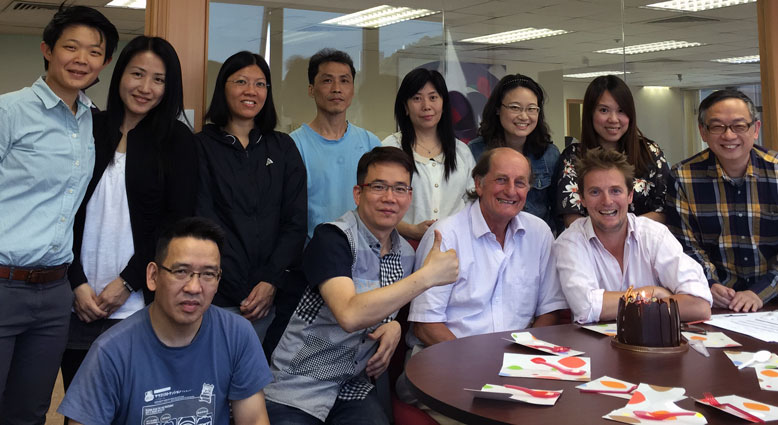
Click on image to view
In 2008 Cole Fabrics set up a joint venture in Milan, Italy called Global Ribbons Italia Srl with an associate business from France, in order to offer both products from both businesses through a single outlet directly to the Italian market.
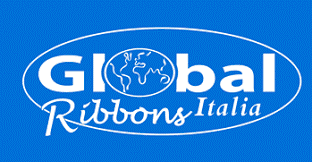
Click on image to view
Cole Fabrics Plc acquired Charles Clay Ltd, who were based in Nelson Lancashire. This acquisition allowed the business to further develop and strengthen the acetate ribbon market which remains important to this day.
The expansion continued with the creation of Cole Fabrics (Far East) Ltd, based in Hong Kong, and joint manufacturing in Mainland China.

Click on image to view
Nick Cole, Dick Cole's son, joins the company.
The end of the century saw Cole Fabrics Plc expanding even further with the acquisition of Taytec, a specialist woven edge ribbon manufacturing operation in Red Scar Business Park, Preston, Lancashire, where we continue to dye our ribbons today.
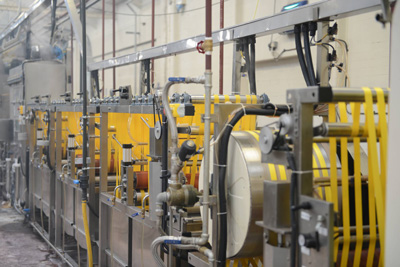
Click on image to view
In 1998 Cole Fabrics merged with John Kingsley's family company Romandus Ribbons, who were based in Croydon at the time. Romandus relocated to Nottingham bringing a wealth of experience with it as well as more machinery requiring a further expansion of Cole’s manufacturing operation into the surrounding buildings. This is why our main building is called “Romandus House”.
1997 marked the creation of Cole Fabrics Plc (moving away from the names Tricoter (Holdings) Limited and D. Cole Fabrics Limited).
In 1986 D. Cole Fabrics moved from Short Hill in the Nottingham Lace Market to its current location on Ludlow Hill Road in West Bridgford, Nottingham.
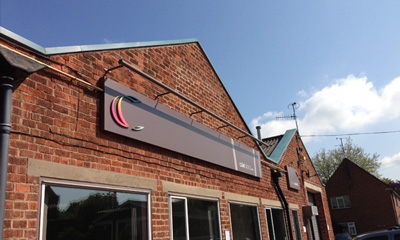
Click on image to view
Following the unfortunate death of Donald Cole in a motor car accident, Shares in the family of companies headed up by Tricoter (Holdings) Limited including Ruban (Mapperley) Limited were purchased by Dick Cole from Alan Jolly. The company operated under the name D. Cole Fabrics Limited. All ribbon sales were now channeled through this Company.
Between 1976 - 1980 the company purchased a total of five new slitting machines.
P.P. Payne closed it’s label operation in Nottingham and as part of the closure three slitting machines and a fabric coating unit were available for purchase, plus they had a division selling Coated Nylon Ribbon for Labels. These were bought by D. Cole Fabrics and moved to Short Hill, Nottingham. The coating plant was closed and commission coating moved to Lotstar Ltd. Ruban (Mapperley) Ltd. At this point they commissioned a second hot slitting machine, with Wilf Justice being bought out of the company. These two machines were also moved to Short Hill in the Lace Market.
In 1978 Dick Cole (Donald’s eldest son) joined the family of companies headed up by Tricoter (Holdings) Limited including Ruban (Mapperley) Limited. They filed a profit of £2,020.
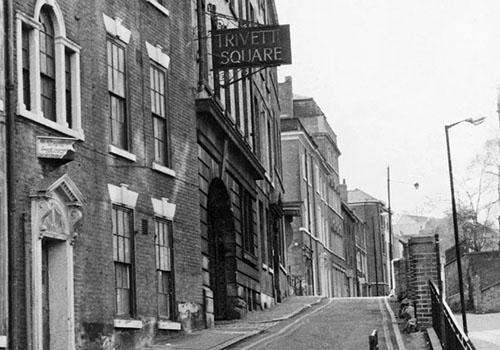
(Photo Credit: Picture Nottingham/B Twelvetrees)
Click on image to view
Don Cole bought shares and became a director of Ruban (Mapperley) Limited along with Alan Jolly and Wilf Justice. They built a hot slitting machine and transferred it at an agreed value of £6,000 to convert fabric into ribbon for printing garment labels. The Company Operated on a Commission Slitting Basis, with the resulting ribbon sold through Tricoter Fabrics Ltd. operating from Newdigate Street, Nottingham.
By 1972 Several of the key directors from P.P. Payne had left to set up a new business in Nottingham called Atlas House. To help fund the business a new company was formed called Tricoter Fabrics Ltd. which was owned 50/50 by Don Cole and Alan Jolly.
This Company was expanded to sell to other customers, however it became clear that many did not have their own slitting facilities and so would only buy ribbon.
Donald (Don) Cole was demobbed from the Navy. He had no job, no home and a new wife. On the train home he met a member of his local church who offered him a job as a yarn agent. Within 3 years he decided to set up on his own as an agent selling yarn and fabrics under the name of D. Cole Fabrics.
One of the agencies was selling acetate satin fabric designed for garment label printing largely to P.P. Payne in Nottingham from A.R. Jolly Ltd (Owned by Allan Jolly).
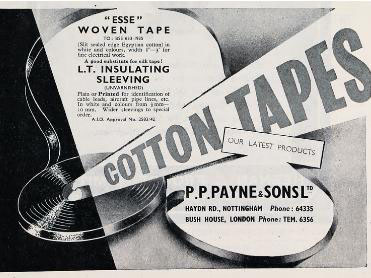
Click on image to view
Herbert inherited the family business in 1926 but they were hit soon after by the 1930's worldwide trade depression. By 1932 Herbert E Cole was listed as a “hosiery agent”.
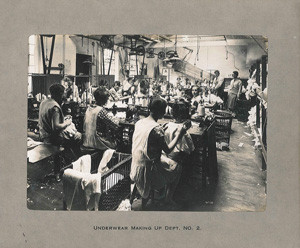
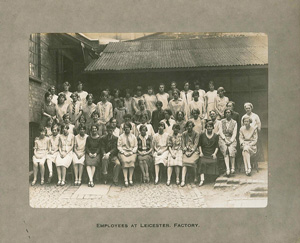
Click on images to view
In 1909 Herbert set up Herbert E Cole & Co. Tailors on St Nicholas Street, Leicester. This was all whilst running the Knitting factory in Great Central Street with his father to manufacture underwear.
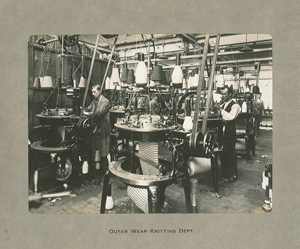
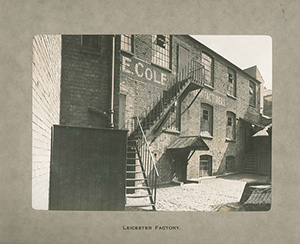
Click on images to view
From the census at the time Fredrick Cole was now a clothier and, along with his son, Herbert Cole, was manufacturing textiles in a knitting factory in Whetstone, Leicester known as “King Cole Underwear Mills”, employing over 100 staff. They drove a van to fairs and delivered underwear to village stores, boasting “unshrinkable” underwear!
Innovations in the 19th century led to boom times in the East Midlands textile industry. Viscose yarn replaced expensive silk, new underwear, stockings and socks were designed, and cheaper, lighter fabrics replaced woolen and worsted clothing. The interlocking machine meant that stockings, socks and cotton fabrics could be made much cheaper and so became more accessible.
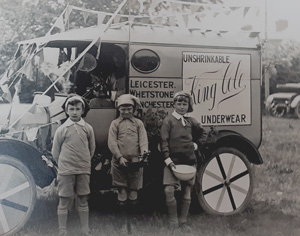
Click on images to view
At this time Fredrick was working as a Tailor and Outfitter in Leicester.
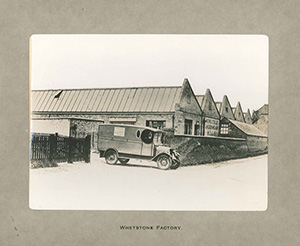
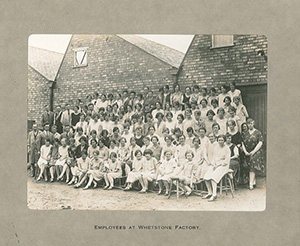
Click on images to view
The story of Cole Fabrics begins in 1860 with Fredrick Cole.
Born in 1847 (the son of a baker), Fredrick was the first Cole in the textile industry. He was sent off at a young age to gain an apprenticeship and learn a trade.